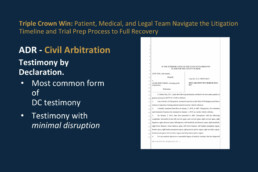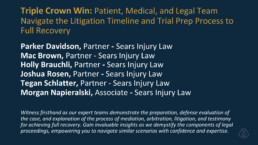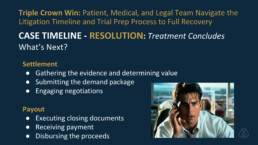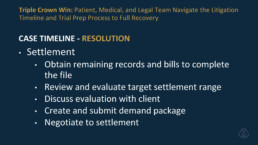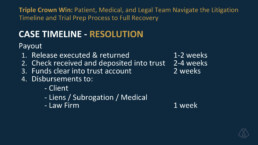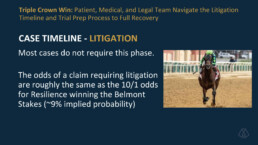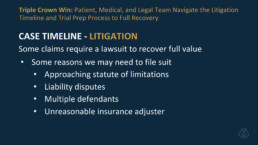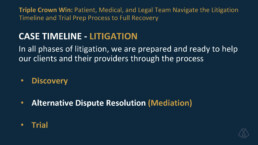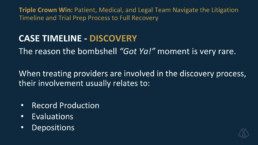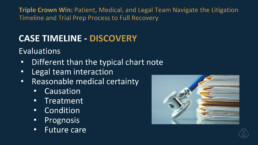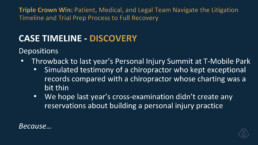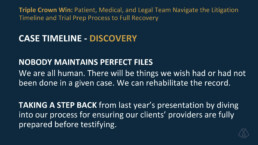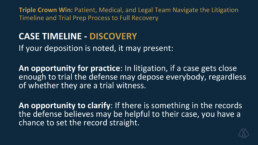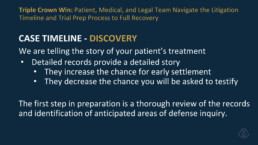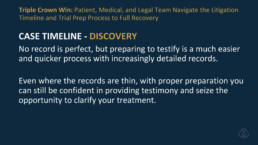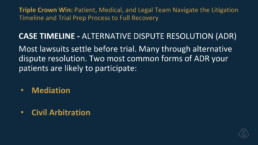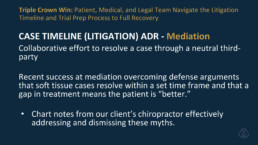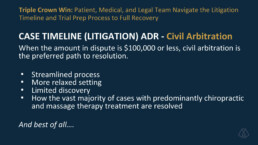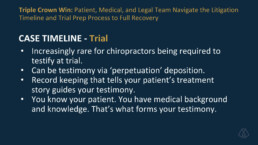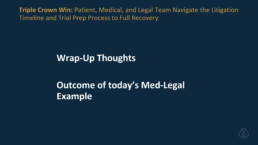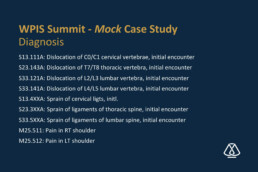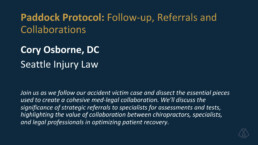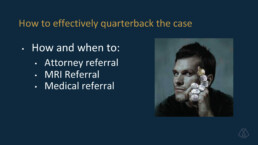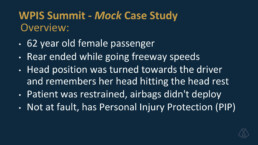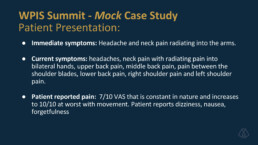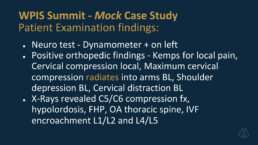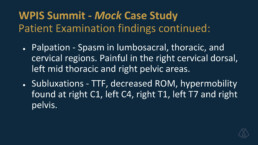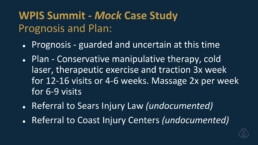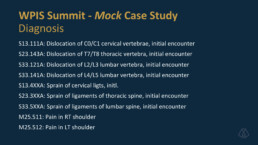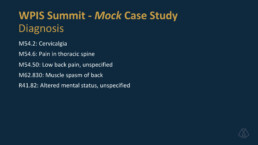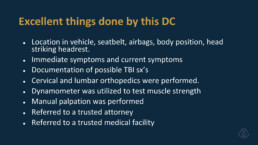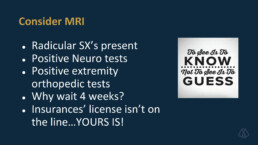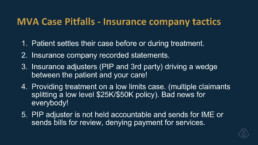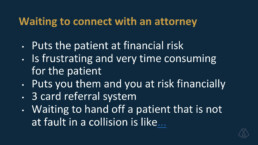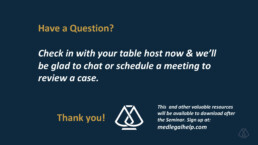Patient, Medical, and Legal Team Navigate the Litigation Timeline and Trial Prep Process to Full Recovery
2024 Washington Personal Injury Summit
Patient, Medical, and Legal Team Navigate the Litigation Timeline and Trial Prep Process to Full Recovery
Parker Davidson, Partner - Sears Injury Law
Mac Brown, Partner - Sears Injury Law
Holly Brauchli, Partner - Sears Injury Law
Joshua Rosen, Partner - Sears Injury Law
Tegan Schlatter, Partner - Sears Injury Law
Morgan Napieralski, Associate - Sears Injury Law
Witness firsthand as our expert teams demonstrate the preparation, defense evaluation of the case, and explanation of the process of mediation, arbitration, litigation, and testimony for achieving full recovery. Gain invaluable insights as we demystify the components of legal proceedings, empowering you to navigate similar scenarios with confidence and expertise.
Follow-up, Referrals and Collaborations
2024 Washington Personal Injury Summit
Follow-up, Referrals and Collaborations
Cory Osborne, DC - Seattle Injury Law
Join us as we follow our accident victim case and dissect the essential pieces used to create a cohesive med-legal collaboration. We'll discuss the significance of strategic referrals to specialists for assessments and tests, highlighting the value of collaboration between chiropractors, specialists, and legal professionals in optimizing patient recovery.
Stages of a Personal Injury Case: What to Expect
Stages of a Case: What to Expect
After we’ve agreed to take on your personal injury claim, there are a series of stages that our attorneys will follow. If you have questions at any point along the way, we invite you to connect with us at any time so that we can provide an update of where your case stands and be sure you are fully informed of status and plan.

Information Stage
New client interview: In this stage we get all the pertinent information regarding your accident injury, including all statements, witnesses, particulars of your injury or accident and your current medical status and providers.
Determine responsible party: This is who we’ll make your claim against. This isn’t always clear at first, so our investigation team will begin looking into the circumstances, insurances and responsible parties to determine who is responsible for your restitution.
Gather evidence: Starting with the information you provide, we will gather and investigate supporting evidence including witness testimonies, photographic or video evidence, police records, etc. to create a solid picture and support for your claim.
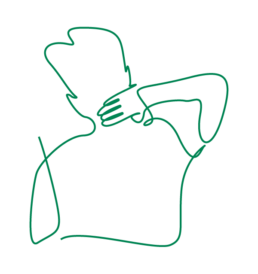
Treatment Stage
Injury Assessment: Using medical reports, medical photographs, and expert medical assessment we will collect information to give evidence of your injuries and life impact. Once you become our client, we will handle gathering all of this for you.
Medical care or rehabilitation: During this phase, we assist in making sure that you have access to and receive treatment for your injuries and complete rehabilitation. This period is dictated by your full-recovery and medical release. We will not begin negotiations with the responsible party until you are well.
Assessment of rehabilitation and on-going support needs: At this point, we will assess your rehabilitation and in some cases, contact the people in charge of your rehabilitation for opinions about how your recovery is going. In some cases, the treatment may be concluded or assessment is made to determine the long-term impacts of your recovery or life-change.
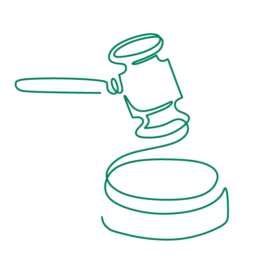
Settlement Stage
Determine compensation: Using our team of experts and legal partners, we consider all the losses incurred from your injury, including damage to vehicles, medical injuries and long-term effects, medical costs, other related costs, and pain and suffering to determine the compensation you deserve.
Reach a settlement: Most of our cases are settled without litigation. This means that our experienced negotiations team will work hard to achieve a fair settlement that will help you to restore the life, health and wealth you deserve.

Payout Stage
Compensation payment: Once the case is settled and payment has been received, we take care of any outstanding payments due from settlement to the proper parties from the trust account. We don’t get paid until you do.

Information Stage
New client interview: In this stage we get all the pertinent information regarding your accident injury, including all statements, witnesses, particulars of your injury or accident and your current medical status and providers.
Determine responsible party: This is who we’ll make your claim against. This isn’t always clear at first, so our investigation team will begin looking into the circumstances, insurances and responsible parties to determine who is responsible for your restitution.
Gather evidence: Starting with the information you provide, we will gather and investigate supporting evidence including witness testimonies, photographic or video evidence, police records, etc. to create a solid picture and support for your claim.

Treatment Stage
Injury Assessment: Using medical reports, medical photographs, and expert medical assessment we will collect information to give evidence of your injuries and life impact. Once you become our client, we will handle gathering all of this for you.
Medical care or rehabilitation: During this phase, we assist in making sure that you have access to and receive treatment for your injuries and complete rehabilitation. This period is dictated by your full-recovery and medical release. We will not begin negotiations with the responsible party until you are well.
Assessment of rehabilitation and on-going support needs: At this point, we will assess your rehabilitation and in some cases, contact the people in charge of your rehabilitation for opinions about how your recovery is going. In some cases, the treatment may be concluded or assessment is made to determine the long-term impacts of your recovery or life-change.

Settlement Stage
Determine compensation: Using our team of experts and legal partners, we consider all the losses incurred from your injury, including damage to vehicles, medical injuries and long-term effects, medical costs, other related costs, and pain and suffering to determine the compensation you deserve.
Reach a settlement: Most of our cases are settled without litigation. This means that our experienced negotiations team will work hard to achieve a fair settlement that will help you to restore the life, health and wealth you deserve.

Payout Stage
Compensation payment: Once the case is settled and payment has been received, we take care of any outstanding payments due from settlement to the proper parties from the trust account. We don’t get paid until you do.

Information Stage
New client interview: In this stage we get all the pertinent information regarding your accident injury, including all statements, witnesses, particulars of your injury or accident and your current medical status and providers.
Determine responsible party: This is who we’ll make your claim against. This isn’t always clear at first, so our investigation team will begin looking into the circumstances, insurances and responsible parties to determine who is responsible for your restitution.
Gather evidence: Starting with the information you provide, we will gather and investigate supporting evidence including witness testimonies, photographic or video evidence, police records, etc. to create a solid picture and support for your claim.

Treatment Stage
Injury Assessment: Using medical reports, medical photographs, and expert medical assessment we will collect information to give evidence of your injuries and life impact. Once you become our client, we will handle gathering all of this for you.
Medical care or rehabilitation: During this phase, we assist in making sure that you have access to and receive treatment for your injuries and complete rehabilitation. This period is dictated by your full-recovery and medical release. We will not begin negotiations with the responsible party until you are well.
Assessment of rehabilitation and on-going support needs: At this point, we will assess your rehabilitation and in some cases, contact the people in charge of your rehabilitation for opinions about how your recovery is going. In some cases, the treatment may be concluded or assessment is made to determine the long-term impacts of your recovery or life-change.
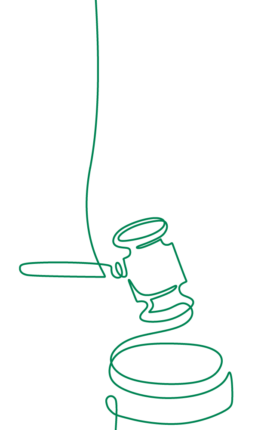
Settlement Stage
Determine compensation: Using our team of experts and legal partners, we consider all the losses incurred from your injury, including damage to vehicles, medical injuries and long-term effects, medical costs, other related costs, and pain and suffering to determine the compensation you deserve.
Reach a settlement: Most of our cases are settled without litigation. This means that our experienced negotiations team will work hard to achieve a fair settlement that will help you to restore the life, health and wealth you deserve.

Payout Stage
Compensation payment: Once the case is settled and payment has been received, we take care of any outstanding payments due from settlement to the proper parties from the trust account. We don’t get paid until you do.
If we have to file suit: what to expect
Most claims are settled before litigation is necessary, but if your case goes to court our dedicated litigation team will take your case into the litigation phase outlined here.
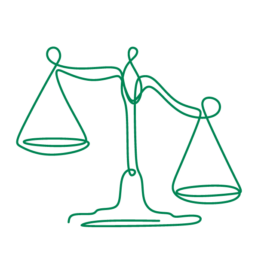
Litigation Stage
Litigation process: If proper settlement is not reached between parties, we will review the damages and evidence and prepare to file a lawsuit on your behalf. While most cases settle without involving the court, if the other party is unreasonable, or we are running out of time, we need to protect your interests. We can continue negotiating for a settlement even after filing a case with the court. There are many ways to settle a case including: negotiations, mediation, arbitration, and trial.
Discovery: After a lawsuit is filed with the court, your case enters the discovery phase where both sides exchange information and gather evidence to support their case.This phase is often where both sides begin to seriously continue negotiations toward reaching an early settlement.
Mediation: This is a process that can be used during litigation. During mediation a neutral third-party will hear from both sides independently in hopes of negotiating a middle ground. While mediation is often successful, neither party is bound to follow the mediator’s opinions or decisions.
Arbitration: Many cases can be resolved through arbitration. Arbitration can best be described as a mini-trial. However, instead of a judge and jury making the decision in your case, it is often an attorney arbitrator who makes decisions. The private hearing is relatively fast-moving and extremely cost-efficient compared to trying a case in court, and the decision is final and must be followed.
Trial: If the case goes to trial, both sides will present their evidence and arguments to a judge or jury, who will then decide the outcome of the case. You will be called to provide testimony and it is likely your providers, and other relevant parties who can provide evidence will be called as witnesses.
Appeal: If either side is unhappy with the outcome of the trial, they may file an appeal to have the decision reviewed by a higher court.

Litigation Stage
Litigation process: If proper settlement is not reached between parties, we will review the damages and evidence and prepare to file a lawsuit on your behalf. While most cases settle without involving the court, if the other party is unreasonable, or we are running out of time, we need to protect your interests. We can continue negotiating for a settlement even after filing a case with the court. There are many ways to settle a case including: negotiations, mediation, arbitration, and trial.
Discovery: After a lawsuit is filed with the court, your case enters the discovery phase where both sides exchange information and gather evidence to support their case.This phase is often where both sides begin to seriously continue negotiations toward reaching an early settlement.
Mediation: This is a process that can be used during litigation. During mediation a neutral third-party will hear from both sides independently in hopes of negotiating a middle ground. While mediation is often successful, neither party is bound to follow the mediator’s opinions or decisions.
Arbitration: Many cases can be resolved through arbitration. Arbitration can best be described as a mini-trial. However, instead of a judge and jury making the decision in your case, it is often an attorney arbitrator who makes decisions. The private hearing is relatively fast-moving and extremely cost-efficient compared to trying a case in court, and the decision is final and must be followed.
Trial: If the case goes to trial, both sides will present their evidence and arguments to a judge or jury, who will then decide the outcome of the case. You will be called to provide testimony and it is likely your providers, and other relevant parties who can provide evidence will be called as witnesses.
Appeal: If either side is unhappy with the outcome of the trial, they may file an appeal to have the decision reviewed by a higher court.

Litigation Stage
Litigation process: If proper settlement is not reached between parties, we will review the damages and evidence and prepare to file a lawsuit on your behalf. While most cases settle without involving the court, if the other party is unreasonable, or we are running out of time, we need to protect your interests. We can continue negotiating for a settlement even after filing a case with the court. There are many ways to settle a case including: negotiations, mediation, arbitration, and trial.
Discovery: After a lawsuit is filed with the court, your case enters the discovery phase where both sides exchange information and gather evidence to support their case.This phase is often where both sides begin to seriously continue negotiations toward reaching an early settlement.
Mediation: This is a process that can be used during litigation. During mediation a neutral third-party will hear from both sides independently in hopes of negotiating a middle ground. While mediation is often successful, neither party is bound to follow the mediator’s opinions or decisions.
Arbitration: Many cases can be resolved through arbitration. Arbitration can best be described as a mini-trial. However, instead of a judge and jury making the decision in your case, it is often an attorney arbitrator who makes decisions. The private hearing is relatively fast-moving and extremely cost-efficient compared to trying a case in court, and the decision is final and must be followed.
Trial: If the case goes to trial, both sides will present their evidence and arguments to a judge or jury, who will then decide the outcome of the case. You will be called to provide testimony and it is likely your providers, and other relevant parties who can provide evidence will be called as witnesses.
Appeal: If either side is unhappy with the outcome of the trial, they may file an appeal to have the decision reviewed by a higher court.

